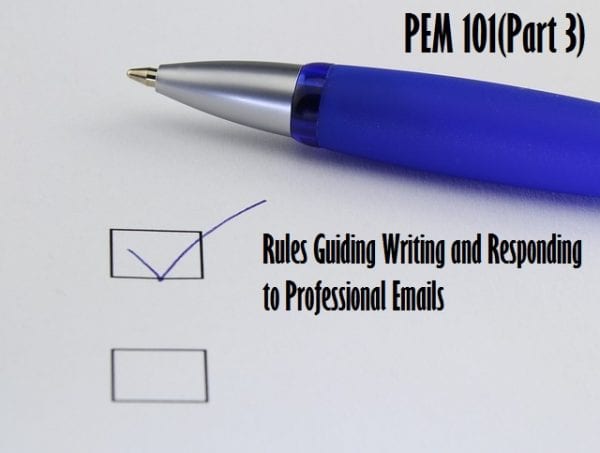PEM 101(Part 3): Rules Guiding Writing and Responding to Professional Emails
Business is serious. That’s why professional emails have rules. These rules will help you avoid the common blunders of email communication.
However, these rules are not set in stone. Take them as guiding principles for effective and professional email communication.
A. Pay Due Attention to Your Grammar and Spellings
Trust me; nothing makes an email uglier than bad grammar and wrong spellings.
It may take you more time to look up words on your PC dictionary, but that time is worth it for professional emails. You should also turn on your word checker.
No matter how good your email is, it lacks professionalism if it contains grammatical flaws or spelling errors.
If you want to improve your writing skills, read The Beginner’s Guide to Writing- 7 SIMPLE TIPS.
B. Write on One Topic at a Time
Emails become boring when they are too long. A recipient is more likely to respond to your email if it is about just one issue and is straight to the point.
There is no harm in writing a follow-up email 3 or 4 days later, but let each email focus on one issue at a time, usually the most important issue.
C. Be SMART in Your Emails
Just like goals should be Specific, Measurable, Attainable, Realistic and Time-bound, professional emails should state the purpose, the required action and the timeline for the action.
D. NEVER EVER WRITE YOUR EMAILS IN CAPITAL LETTERS
What did you just notice?
I shouted at you, right?
That is not courteous enough for your clients. When you write your emails in capital letters, you shout at the reader.
E. Avoid Using Common Abbreviations like IMHO, BTW etc
These abbreviations are better used for casual conversations with close friends. When you are making professional contacts, steer clear of them.
F. For Effective Contact, Add Voice to Your Text
Emails become much more effective when you contact your client on phone. After the call, they can check their emails for attached documents and to remind them of your discussion.
Depending on the particular circumstance, call your client or prospect and let him or her know that you are about to send an email, but you are calling to get more information. If you delay sending the email, you can call afterward to let the client know that you have sent the email and are waiting for a response.
G. Avoid Reprimanding a Client in an Email
Believe me; the outcome of rebuking people in emails is never favorable.
H. Do Not Attach Large Files Unless it is Absolutely Necessary
Emails carrying large files are usually received in the spam box and may not be seen by clients. It is better to contact your client and let the client know that you are about to send an email containing a large file.
I. Avoid Sending SPAMS
Simply, do not send emails to people who may not be interested in you or you do not know.
J. Ensure You Have the Correct Email Address for Your Client
Sending an email to an incorrect email address can be very embarrassing for a serious businessperson. You know the feeling when your client calls that he has been waiting for your email for a week and you both start debating how the email got lost.
K. Read over Your Email Before You Click ‘Send’
This is a basic rule of writing professionally. Always read through your emails before assuming to have finished writing – you may have omitted an important detail.
L. Follow the Old AIDA (Attraction, Interest, Desire, and Action) Writing Formula
It still works.
First get the ATTRACTION of the reader with an interesting introductory sentence; empathize with the problem and state his or her benefit to get the INTEREST; make an offer to make your prospect DESIRE your product or service; give a call to ACTION to get your prospect to make the decision you want.
All the best in your business.
If you haven’t, please read:
- PEM 101 (Part 1): Tips and Templates of Writing Professional Emails
- PEM 101 (Part 2): Tips and Templates of Responding to Professional Emails
- PEM 101 (Part 4): Summary of Writing and Responding to Professional Emails
Recommended Text
Deciding the right phrase to handle different situations can be very tasking, especially if English is not your first language. As a correspondent, you are directly involved in critical day-to-day interactions via email. This makes your ability to craft good email messages, using the perfect phrases and clauses, tangential to your business success.
There is a book by Meryl Runion that will help you to a great extent even if English is not your first language:
Perfect Phrases for Office Professionals: Hundreds of ready-to-use phrases for getting respect, recognition, and results in today’s workplace
Overall, this book will greatly improve your communication skills. It will also help you easily clarify assignments with your manager or projects with your clients, as well as guide you in handling the inevitable complaints that sometimes follow sales of products or services.
